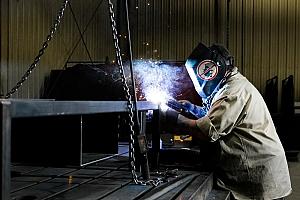- FMA
- The Fabricator
- FABTECH
- Canadian Metalworking
Categories
- Additive Manufacturing
- Aluminum Welding
- Arc Welding
- Assembly and Joining
- Automation and Robotics
- Bending and Forming
- Consumables
- Cutting and Weld Prep
- Electric Vehicles
- En Español
- Finishing
- Hydroforming
- Laser Cutting
- Laser Welding
- Machining
- Manufacturing Software
- Materials Handling
- Metals/Materials
- Oxyfuel Cutting
- Plasma Cutting
- Power Tools
- Punching and Other Holemaking
- Roll Forming
- Safety
- Sawing
- Shearing
- Shop Management
- Testing and Measuring
- Tube and Pipe Fabrication
- Tube and Pipe Production
- Waterjet Cutting
Industry Directory
Webcasts
Podcasts
FAB 40
Advertise
Subscribe
Account Login
Search
Offshore outsourcing—an economic and political issue
- By Vicki Bell
- March 11, 2004
- Article
- Shop Management
 |
When it comes to solving the economic problems, I'll believe it when I see it—meaning when my unemployed children and friends find work at salaries above the poverty level. They and I understand that a slow recovery is under way and that these problems, which didn't happen overnight, will take some time to remedy. What we want to see is a solution that works for the U.S. long-term. Not a quick fix that leads to the same problems or worse down the road.
Offshore Outsourcing
Offshore outsourcing, one of the factors politicians, unions, and the average worker cite as contributing to the disappearance of U.S. jobs, is a hot political topic that will influence many voters' choices Nov. 2. Outsourcing—even offshore outsourcing—isn't new. Manufacturing has been outsourcing offshore for years. Both union and nonunion workers long have urged Congress to do something to stem the tide of offshore outsourcing. It's become a more visible problem because high-tech and service jobs now are moving offshore, and because too few good-paying jobs remain to employ the displaced workers.
Outsourcing can be a cost-effective tool for a company to increase its product line and customer base without incurring capital investment, heavy taxes, and high overhead. Ideally, it's a win-win situation for all involved, including the consumer who may benefit from lower prices because of a company's lower overhead. Unfortunately, offshore outsourcing often is not as lucrative as companies are led to believe. Underassessing the opportunity, many companies fail to realize the savings they expected. The more cost-effective labor may not have the training and skills necessary to perform quality work. Price reductions, if any, may not trickle down to the consumer.
Curbing Offshore Outsourcing
High unemployment rolls mean fewer buyers, and a growing U.S. backlash to offshore outsourcing may result in lost business for companies that outsource. As a result, fewer companies may be inclined to think about moving operations offshore. A company's image is tarnished when it turns up on Lou Dobbs' listof companies that are exporting U.S. jobs and other corporate hit lists.
Responding to protests, current lawmakers and lobbyists are working to ban offshore outsourcing. In February 2004, U.S. Sen. Christopher Dodd, D-Conn., introduced the U.S. Workers Protection Act, intended to ban offshore outsourcing in three government work areas: federal work privatizing, federal purchasing of goods and services, and state government procurements using federal funds. Under the act, state governments would be eligible to receive federal funds only after they certify that the money will not go offshore. The senator asserted that the U.S. is losing jobs at an alarming rate, saying that the country has lost 2.7 million manufacturing jobs since 2001, and as many as 3.3 million jobs may be sent overseas in the next 15 years.
Introducing the Save American Manufacturing Act of 2003, Sen. Fritz Hollings, D-S.C., said, "Our factories have been swamped by a flood of imports. Each month seems to bring a record trade deficit and more stories of plants closing and moving offshore. Our communities, particularly the rural ones, quite literally are emptying out. During the '90s, imports soared by more than 107 percent. Our trade surplus with Mexico dissolved soon after NAFTA went into effect. From 1991 to 2001, our trade deficit went from $77 billion to $427 billion, costing us thousands of jobs. Essentially, our trading partners are exporting their unemployment to us."
Remember the Steel Tariffs?
Before we jump blindly into penalizing companies that outsource offshore, thinking doing so magically will make jobs return, let's look back at the steel tariff issue. Steel companies lobbied the government to enact duties on foreign steel in an effort to save the steel-producing industry. The squeaky wheel and politicians from steel-producing states prevailed. The resulting tariffs were disastrous for the metal fabricating industry, and even with the tariffs, steel companies continued to file bankruptcy.
Because of the efforts of metal fabricators, lawmakers such as Rep. Don Manzullo, R-Ill., and the World Trade Organization's ruling that they were illegal, the tariffs were rescinded last fall. Now there's a steel shortage as China consumes vast amounts for its booming operations. U.S.-based producers have raised prices. Combine the materials shortage with the price increases, and the metal fabricator still gets the short end of the stick. While some steel producing companies may have benefited from the tariffs, was the overall effect beneficial to manufacturing? It doesn't appear so.
It's a Global Problem
The current economy is the world's problem, not just the U.S.'s problem. The U.S. is not an isolated, protectionist country, although some wish it were. To become so would stunt rather than foster long-term economic growth. The U.S. imports as well as exports. Placing unfair restrictions on trade could impair U.S. relations with its trading partners and ultimately shrink the U.S. marketplace.
It's time that lawmakers, company leaders, and workers worldwide address these very global economic problems. The ideal solution would be one that fosters free trade yet encourages a deficit reduction, provides incentives for companies to invest in U.S. jobs, and requires all groups with a vested interest in the current economic situation to sit down together and come up with a workable solution to the issues—not special-interest bandages
Perhaps reducing or eliminating offshore outsourcing will create more U.S. jobs, but can we reasonably expect all U.S. companies to refrain from outsourcing offshore, when, without that option, some of them might go out of business? Are we prepared to subsidize manufacturing long-term? The government we elect and support must work toward and implement economic strategies that not only address current issues, but also position the U.S. economy for future health in a global marketplace.
The Candidates' Positions
On March 2, Super Tuesday, I exercised my civic duty and privilege by voting in the Georgia presidential primary. Leading up to the event, the Atlanta Journal-Constitution(AJC) regularly featured a chart comparing the candidates' positions on issues.1Second only to the Bio section, the Trade/Job Creation section of the chart contained the most information. Politicians recognize that the economy, especially unemployment and the budget deficit, will be on the voters' minds as they cast their ballots in November.
The Sunday before the primary, the AJCchart included the candidates in the race at that time: George Bush, John Edwards, John Kerry, Dennis Kucinich, and Al Sharpton. Following Super Tuesday, John Edwards withdrew his candidacy. Here's what the AJCreported regarding Bush's and the remaining Democratic candidates' positions on trade and job creation:
President Bush
Supports liberalized trade including NAFTA; signed trade agreements with Chile and Singapore; seeking major agreement with other nations in the Western Hemisphere; normalized trade relations with China. Says opening new markets overseas will create new jobs for Americans. Advocates streamlining regulations for small businesses to boost job production.
Senator John Kerry
Supports NAFTA and other trade agreements. Votes for normalized relations with China. Says agreements should have labor and environmental standards, but U.S. cannot insist that foreign standards rise to U.S. standards. Would end tax breaks and lucrative contracts for jobs being shipped to other countries. Would seek to make it easier to invest in fast-growing companies in U.S.
Representative Dennis Kucinich
Would withdraw U.S. from multilateral trade agreements and seek bilateral trade treaties based on labor and environmental standards and human rights protections. Calls for $50 billion in zero-interest loans to rebuild U.S. infrastructure and create 2 million new jobs.
Reverend Al Sharpton
Opposes NAFTA and says trade deals cannot ignore labor, environmental, and human rights conditions abroad. Says the agreements have not helped nations abroad secure rights for laborers and have cost Americans jobs.2
In my opinion, it's admirable to be patriotic—to put our country first and whenever possible buy products made in the U.S., something we should do in good and bad economic times. I renewed my efforts to buy U.S.-made products at the beginning of the year and continue to do so. This effort, along with casting an educated vote in the November election and hoping that our elected officials will act responsibly to enact sound economic policies instead of pandering to companies that fill campaign coffers, is about the best I can do.
1.The AJC's sources for this information are the Associated Press, Project Vote Smart, On the Issues, The New York Times, C-b.org.
About the Author

Vicki Bell
2135 Point Blvd
Elgin, IL 60123
815-227-8209
subscribe now

The Fabricator is North America's leading magazine for the metal forming and fabricating industry. The magazine delivers the news, technical articles, and case histories that enable fabricators to do their jobs more efficiently. The Fabricator has served the industry since 1970.
start your free subscription- Stay connected from anywhere

Easily access valuable industry resources now with full access to the digital edition of The Fabricator.

Easily access valuable industry resources now with full access to the digital edition of The Welder.

Easily access valuable industry resources now with full access to the digital edition of The Tube and Pipe Journal.
- Podcasting
- Podcast:
- The Fabricator Podcast
- Published:
- 05/07/2024
- Running Time:
- 67:38
Patrick Brunken, VP of Addison Machine Engineering, joins The Fabricator Podcast to talk about the tube and pipe...
- Trending Articles
How laser and TIG welding coexist in the modern job shop

Young fabricators ready to step forward at family shop

Material handling automation moves forward at MODEX

A deep dive into a bleeding-edge automation strategy in metal fabrication

Precision Press Brake Certificate Course

- Industry Events
World-Class Roll Forming Workshop
- June 5 - 6, 2024
- Louisville, KY
Advanced Laser Application Workshop
- June 25 - 27, 2024
- Novi, MI
Precision Press Brake Certificate Course
- July 31 - August 1, 2024
- Elgin,


























